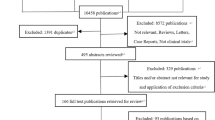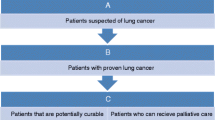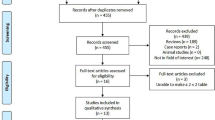Abstract
This study assessed the use of positron emission tomography (PET) in identifying and diagnosing solitary pulmonary nodules (SPNs). For this a decision analysis model was constructed, and three alternatives were compared: wait and watch (WW), PET and anatomical computed tomography (PET), and CT plus PET (CT+PET). Transition probabilities were estimated from published data and consultations with experts. Costs of diagnosis were derived from the French reimbursement scale, and treatment costs from a national hospital database of diagnosis-related groups. The base case was defined as a 65-year-old male smoker with a 2-cm SPN and an associated high risk of malignancy of 43%. Evaluation criteria included incremental cost-effectiveness ratios and the proportion of unnecessary operations avoided in patients without malignant SPN. For the base case WW was the least effective and cheapest strategy. CT+PET was more effective and presented lower incremental cost-effectiveness ratio (€3,022 per life-year gained). It also was superior to PET in cost-effectiveness terms and resulted in 4.3% fewer unnecessary resections of benign SPN than did PET. Risk profile analyses performed on SPN malignancy risk showed that CT + PET remains the most cost-effective strategy in the range of 5.7–87%, and that WW is more cost-effective in the range of 0.3–5.0%. CT+PET is thus cost-effective in detecting malignant SPN in patients with a risk of malignity of at least 5.7% and may avoid inappropriate resections of benign SPN. These findings support the attempts to introduce a larger number of PETs in France for SPN diagnosis.





Similar content being viewed by others
References
Berrino F, Copocaccia R, Estève J, Gatta G, Hakulinen T, Micheli A, Sant M, Verdecchia A (1999) Survival of cancer patients in Europe: the EUROCARE-2 study. IARC: Lyon
Hanley KS, Rubins JB (2003) Classifying solitary pulmonary nodules. New imaging methods to distinguish malignant, benign lesions. Postgrad Med 114:29–35
Bernard A, Binquet C, Lejeune C, Hagry C, Quantin C, Faivre J, Favre JP (2002) A diagnostic strategy for isolated pulmonary nodules less than 2 cm in diameter. Rev Mal Respir 19:569–576
Kunstaetter R, Wolkove N, Kreisman H, Cohen C, Frank H (1985) The solitary pulmonary nodule. Decision analysis. Med Decis Making 5:61–75
Gupta NC, Maloof J, Gunel E (1996) Probability of malignancy in solitary pulmonary nodules using fluorine-18-FDG and PET. J Nucl Med 37:943–948
Bury T, Dowlati A, Paulus P, Corhay JL, Benoit T, Kayembe JM, Limet R, Rigo P, Radermecker M (1996) Evaluation of the solitary pulmonary nodule by positron emission tomography imaging. Eur Respir J 9:410–414
Duhaylongsod FG, Lowe VJ, Patz EF Jr, Vaughn AL, Coleman RE, Wolfe WG (1995) Detection of primary and recurrent lung cancer by means of F-18 fluorodeoxyglucose positron emission tomography (FDG PET). J Thorac Cardiovasc Surg 110:130–140
Hung GU, Shiau YC, Tsai SC, Ho YJ, Kao CH, Yen RF (2001) Differentiation of radiographically indeterminate solitary pulmonary nodules with [18F]fluoro-2-deoxyglucose positron emission tomography. Jpn J Clin Oncol 31:51–54
Halter G, Storck M, Guhlmann A, Frank J, Grosse S, Liewald F (2000) FDG positron emission tomography in the diagnosis of peripheral pulmonary focal lesions. Thorac Cardiovasc Surg 48:97–101
Dietlein M, Weber K, Gandjour A, Moka D, Theissen P, Lauterbach KW, Schicha H (2000) Cost-effectiveness of FDG-PET for the management of solitary pulmonary nodules: a decision analysis based on cost reimbursement in Germany. Eur J Nucl Med 27:1441–1456
Gambhir SS, Shepherd JE, Shah BD (1998) Analytical decision model for the cost-effective management of solitary pulmonary nodules. J Clin Oncol 16:2113–2125
Gould MK, Maclean CC, Kuschner WG, Rydzak CE, Owens DK (2001) Accuracy of positron emission tomography for diagnosis of pulmonary nodules and mass lesions: a meta-analysis. JAMA 285:914–924
Santambrogio L, Nosotti M, Bellaviti N, Pavoni G, Radice F, Caputo V (1997) CT-guided fine-needle aspiration cytology of solitary pulmonary nodules: a prospective, randomized study of immediate cytologic evaluation. Chest 112:423–425
Wicky S, Mayor B, Cuttat JF, Schnyder P (1994) CT-guided localizations of pulmonary nodules with methylene blue injections for thoracoscopic resections. Chest 106:1326–1328
Siegelman SS, Khouri NF, Leo FP, Fishman EK, Braverman RM, Zerhouni EA (1986) Solitary pulmonary nodules: CT assessment. Radiology 160:307–312
Bourguet P (2003) Standards, options and recommendations for the use of PET-FDG in cancerology. Bull Cancer 90:34–39
Henschke CI, McCauley DI, Yankelevitz DF, Naidich DP, McGuinness G, Miettinen OS, Libby DM, Pasmantier MW, Koizumi J, Altorki NK, Smith JP (1999) Early Lung Cancer Action Project: overall design and findings from baseline screening. Lancet 354:99–105
Steele JD, Buell P (1973) Asymptomatic solitary pulmonary nodules. Host survival, tumor size, and growth rate. J Thorac Cardiovasc Surg 65:140–151
Yankelevitz DF, Reeves AP, Kostis WJ, Zhao B, Henschke CI (2000) Small pulmonary nodules: volumetrically determined growth rates based on CT evaluation. Radiology 217:251–256
Midthun DE, Swensen SJ, Jett JR (1992) Clinical strategies for solitary pulmonary nodule. Annu Rev Med 43:195–208
Sonnenberg FA, Beck JR (1993) Markov models in medical decision making: a practical guide. Med Decis Making 13:322–338
Mack MJ, Hazelrigg SR, Landreneau RJ, Acuff TE (1993) Thoracoscopy for the diagnosis of the indeterminate solitary pulmonary nodule. Ann Thorac Surg 56:825–830
Bernard A (1996) Resection of pulmonary nodules using video-assisted thoracic surgery. The Thorax Group. Ann Thorac Surg 61:202–204
Greene R, Szyfelbein WM, Isler RJ, Stark P, Janstsch H (1985) Supplementary tissue-core histology from fine-needle transthoracic aspiration biopsy. AJR Am J Roentgenol 144:787–792
Charig MJ, Phillips AJ (2000) CT-guided cutting needle biopsy of lung lesions-safety and efficacy of an out-patient service. Clin Radiol 55:964–969
Dewan NA, Reeb SD, Gupta NC, Gobar LS, Scott WJ (1995) PET-FDG imaging and transthoracic needle lung aspiration biopsy in evaluation of pulmonary lesions. A comparative risk-benefit analysis. Chest 108:441–446
Charig MJ, Stutley JE, Padley SP, Hansell DM (1991) The value of negative needle biopsy in suspected operable lung cancer. Clin Radiol 44:147–149
Al-Damegh S (2001) Fine needle aspiration of solitary pulmonary lesions. Eur J Radiol 37:200–203
Dennie CJ, Matzinger FR, Marriner JR, Maziak DE (2001) Transthoracic needle biopsy of the lung: results of early discharge in 506 outpatients. Radiology 219:247–251
Richardson CM, Pointon KS, Manhire AR, Macfarlane JT (2002) Percutaneous lung biopsies: a survey of UK practice based on 5444 biopsies. Br J Radiol 75:731–735
Duque JL, Ramos G, Castrodeza J, Cerezal J, Castanedo M, Yuste MG, Heras F (1997) Early complications in surgical treatment of lung cancer: a prospective, multicenter study. Grupo Cooperativo de Carcinoma Broncogenico de la Sociedad Espanola de Neumologia y Cirugia Toracica. Ann Thorac Surg 63:944–950
Zwirewich CV, Vedal S, Miller RR, Muller NL (1991) Solitary pulmonary nodule: high-resolution CT and radiologic-pathologic correlation. Radiology 179:469–476
Swensen SJ, Brown LR, Colby TV, Weaver AL, Midthun DE (1996) Lung nodule enhancement at CT: prospective findings. Radiology 201:447–455
Prauer HW, Weber WA, Romer W, Treumann T, Ziegler SI, Schwaiger M (1998) Controlled prospective study of positron emission tomography using the glucose analogue [18f]fluorodeoxyglucose in the evaluation of pulmonary nodules. Br J Surg 85:1506–1511
Kubota K, Matsuzawa T, Fujiwara T, Ito M, Hatazawa J, Ishiwata K, Iwata R, Ido T (1990) Differential diagnosis of lung tumor with positron emission tomography: a prospective study. J Nucl Med 31:1927–1932
Lowe VJ, Fletcher JW, Gobar L, Lawson M, Kirchner P, Valk P, Karis J, Hubner K, Delbeke D, Heiberg EV, Patz EF, Coleman RE (1998) Prospective investigation of positron emission tomography in lung nodules. J Clin Oncol 16:1075–1084
Detsky AS, Naglie G, Krahn MD, Redelmeier DA, Naimark D (1997) Primer on medical decision analysis. II. Building a tree. Med Decis Making 17:126–135
Cummings SR, Lillington GA, Richard RJ (1986) Estimating the probability of malignancy in solitary pulmonary nodules. A Bayesian approach. Am Rev Respir Dis 134:449–452
Beck JR, Kassirer JP, Pauker SG (1982) A convenient approximation of life expectancy (the “DEALE”). I. Validation of the method. Am J Med 73:883–888
Beck JR, Pauker SG, Gottlieb JE, Klein K, Kassirer JP (1982) A convenient approximation of life expectancy (the “DEALE”). II. Use in medical decision-making. Am J Med 73:889–897
Beck JR, Pauker SG (1999) Does DEALE-ing stack the deck? Med Decis Making 19:503–504
Beaumel C, Doisneau L, Vatan M (2002) Life tables 1997–1999. In: Demographic situation in 1999, vol 3, p 202. INSEE: Paris
Lopez-Encuentra A, Bulzebruck H, Feinstein AR, Motta G, Mountain CF, Naruke T, Sanchez JM, Tsuchiya R, Wittekind C (2000) Tumor staging and classification in lung cancer. Summary of the international symposium. Madrid, Spain, 3–4 December 1999. Lung Cancer 29:79–83
Gail MH, Eagan RT, Feld R, Ginsberg R, Goodell B, Hill L, Holmes EC, Lukeman JM, Mountain CF, Oldham RK et al. (1984) Prognostic factors in patients with resected stage I non-small cell lung cancer. A report from the Lung Cancer Study Group. Cancer 54:1802–1813
Black WC, Armstrong P, Daniel TM (1988) Cost effectiveness of chest CT in T1N0M0 lung cancer. Radiology 167:373–378
Jackman RJ, Good CA, Clagett OT, Woolner LB (1969) Survival rates in peripheral bronchogenic carcinomas up to four centimeters in diameter presenting as solitary pulmonary nodules. J Thorac Cardiovasc Surg 57:1–8
Santambrogio L, Nosotti M, Bellaviti N, Mezzetti M (1995) Videothoracoscopy versus thoracotomy for the diagnosis of the indeterminate solitary pulmonary nodule. Ann Thorac Surg 59:868–870
Bergeal E (2000) Economic evaluation of positron emission tomography: the Champardennais project. Thesis, Reims University
Fauchet M, Vernon JD (1998) Positron emission tomography in clinical routine: financial and industrial perspectives. RBM 20:180–182
Drummond MF, Jefferson TO (1996) Guidelines for authors and peer reviewers of economic submissions to the BMJ. BMJ 313:275–283
Elixhauser A, Halpern M, Schmier J, Luce BR (1998) Health care CBA and CEA from 1991 to 1996: an updated bibliography. Med Care 36: MS18–147
Laupacis A, Feeny D, Detsky AS, Tugwell PX (1992) How attractive does a new technology have to be to warrant adoption and utilization? Tentative guidelines for using clinical and economic evaluations. Can Med Assoc J 146:473–481
Raftery J (2001) NICE: faster access to modern treatments? Analysis of guidance on health technologies. BMJ 323:1300–1303
Gould MK, Sanders GD, Barnett PG, Rydzak CE, Maclean CC, McClellan MB, Owens DK (2003) Cost-effectiveness of alternative management strategies for patients with solitary pulmonary nodules. Ann Intern Med 138:724–735
Barton P, Bryan S, Robinson S (2004) Modelling in the economic evaluation of health care: selecting the appriopriate approach. J Health Serv Res Policy 9:110–118
Karnon J (2003) Alternative decision modelling techniques for the evaluation of health care technologies: Markov processes versus discrete event simulation. Health Econ 12:837–848
Acknowledgements
The following experts contributed to the choice of clinical parameters and the building of the decision tree: Dr. P. Arveux (epidemiologist), Pr. A. Bernard (thoracic surgeon), Pr. A. Bertrand (nuclear physician), Pr. P. Bey (radiotherapist), Dr. C. Binquet (biostatistician), Dr. A. Bizieux-Thaminy (pneumologist), Pr. S. Briançon (epidemiologist), Pr. F. Brunotte (nuclear physician), Pr. J.C. Cardot (nuclear physician), Pr. A. Constantinesco (nuclear physician), Pr. A. Depierre (pneumologist), Dr. P. Foucher (pneumologist), Pr. J.C. Grob (nuclear physician), Pr. F. Guillemin (epidemiologist), Pr. D. Jolly (epidemiologist), Pr. G. Karcher (nuclear physician), Pr. D. Krause (radiologist), Pr. J.C. Liehn (nuclear physician), Pr. Y. Martinet (pneumologist), Dr. O. Ménard (pneumologist), Pr. E. Quoix (pneumologist), Dr. M. Velten (epidemiologist), Pr. D. Wahl (pneumologist), and Pr. M.C. Woronoff-Lemsi (pharmacoeconomist). The authors also thank the following for their contribution for the choice of economic parameters: Dr. M.J. Bismuth, Dr. P. Métral, Pr. C. Quantin, Mrs. M. Vourc’h (Department of medical information-CHU Dijon), Dr. F. Sassi (Department of Social Policy-London School of Economics), Mr. R. Alexandre, Mrs. A. Baron, Dr. M. Bonnans, Mrs. F. Cambecedes, Mrs. N. Carlot, Mrs. N. Jacotot, Dr. M.F. Merentier, Dr. C. Zanni (staff of the Health Insurance of the Counties of Burgundy and Franche-Comté), Pr. J.C. Moisdon (Department of Management-Ecole des Mines-Paris), Dr. S. Limat (Pharmacy Department-Besançon), and Dr. K. Al Zahouri (Department of Epidemiology-Nancy). The research was supported by grants from the Ministry of Health, Urban Community of Nancy, and Lorraine Region.
Interessenkonflikt:
Keine Angaben
Author information
Authors and Affiliations
Corresponding author
Rights and permissions
About this article
Cite this article
Lejeune, C., Al Zahouri, K., Woronoff-Lemsi, MC. et al. Use of a decision analysis model to assess the medicoeconomic implications of FDG PET imaging in diagnosing a solitary pulmonary nodule. Eur J Health Econ 6, 203–214 (2005). https://doi.org/10.1007/s10198-005-0279-0
Issue Date:
DOI: https://doi.org/10.1007/s10198-005-0279-0




